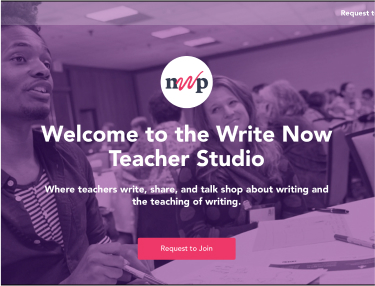Discover Content
Results for “Writing Assessment”
What Makes an American Creed Photo Essay a Strong Piece of Civically Engaged Writing?
Using the National Writing Project’s Civically Engaged Analysis Continuum (CEWAC), I have highlighted the composition choices of two photo essays from the American Creed project and created annotations about what makes these photo essays strong pieces of civically engaged writing.
The NWP Multimodal Assessment Project
Lanette Jimerson shared her experience with the newly formed NWP Multimodal Assessment Project Committee in 2010-11.
For the Sake of Argument: Teaching Evidence-Based Writing
The instructional resources contained in this article are designed to develop specific argument skills and include text sets that represent multiple perspectives on a topic. The resources also emphasize iterative reading and writing practices, the recursive development of claims, organizing…
Handwringing Moments in Teaching
Assessing Writing, Teaching Writers, by Mary Ann Smith and Sherry Swain, introduces the Analytic Writing Continuum (AWC), a writing rubric/assessment tool developed over time by researchers and educators, which has long been the centerpiece of National Writing Project scoring conferences. In…
Standardized Writing Opportunities: A Case Study of Writing Instruction in Inclusive Classrooms
This study of the writing opportunities provided to middle school students with disabilities in an inclusion setting finds that standardized goals and outcomes (driven by accountability policy) and a lack of differentiation are the norm, resulting in low-quality writing instruction for these…
Writing Now: A Policy Research Brief by the National Council of Teachers of English
NCTE's policy statement on Writing Now, despite its publication date, is still relevant for teachers and schools taking first steps beyond traditional assignments. Teacher-leaders might use it to reflect with colleagues on the kinds of writing young people experience across the curriculum…
Writing Essays by Formula Teaches Students How Not to Think
What happens when we allow a tool to become our desired outcome? Education scholar David Labaree explores the dominance of the five-paragraph essay (and its lengthier relatives), and examines the consequences of valuing form over content and meaning.
Making Classroom Writing Assessment More Visible, Equitable, and Portable through Digital Badging
Educator Stephanie West-Puckett describes her experience using collaboratively designed digital badges as a networked, contextual, and participatory form of writing assessment in a college first-year writing course. She describes how this “community-based assessment” supported diverse…
Book Review: Rethinking Rubrics in Writing Assessment
This review describes the work of high school teacher and author Maja Wilson, whose book examines what assessment without rubrics looks like and where it may take us. The sample chapter, "My Troubles with Rubrics," advises that instead of reviewing student papers based on prescribed…
Planning for Writing Instruction
In this brief tip from his book, When Writing Workshop Isn't Working, Mark Overmeyer describes a process of collaborative backward planning that provides a scope and sequence for the year that meets district curriculum requirements, allows for the study of genres connected to various…
Democracy, Struggle, and the Praxis of Assessment
Invited to assist in restructuring the assessment practices of a college first-year writing program, Tony Scott and Lil Brannon examine the structure and ideology of the existing assessment system, exploring how it serves to preserve the status quo by providing seemingly objective proof of…
Write Now Teacher Studio

Where teachers write, share, and talk shop about writing and the teaching of writing
Hosted by the National Writing Project, the Write Now Teacher Studio is an open, online community of educators for educators. It’s a place to write together, examine our teaching, create and refine curricula, and work toward ever more effective and equitable practices to create confident, creative, and critical thinkers and writers in our classrooms and courses.

